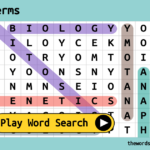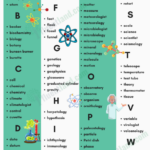Biology Words That Start With G
1. Gene
2. Gamete
3. Genotype
4. Genomics
5. Germination
6. Golgi apparatus
7. Genome
8. Gametogenesis
9. Genus
10. Genetic variation
11. Growth hormone
12. Gene expression
13. Glucose
14. Glycolysis
15. Germline
16. Genetic code
17. Germ cell
18. Genomic imprinting
19. Guard cell
20. Greenhouse
21. Granulocyte
22. Gastrulation
23. Genetic engineering
24. Gene pool
25. Genetically modified organism (GMO)
26. Glycogen
27. Germ theory
28. Gallbladder
29. Glutamate
30. Gel electrophoresis
More About Biology Words That Start With G
Welcome to our captivating exploration of biology vocabulary, where each letter of the alphabet takes us on a veritable scientific journey. In this installment, we delve into the mesmerizing world of biology words that begin with the letter “G.” From complex organisms to intricate processes, the diversity showcased by these words highlights the marvels and complexities of life on our planet.
Growth, an intrinsic characteristic of living things, is an excellent starting point for our exploration. In biology, growth refers to the increase in size, number, or complexity of an organism over time. From the growth of a tiny seed to the towering majesty of a tree, or the gradual maturation of a vulnerable newborn into a robust adult, growth is an essential aspect of biology that defines and shapes the living world around us.
Gene, a fundamental concept in biology, holds the key to heredity and genetic information. Genes are segments of DNA that provide instructions for building proteins, which in turn determine an organism’s traits and characteristics. Studying genes allows us to understand the mechanisms behind evolutionary changes, as well as the development and functioning of living organisms. Genes shape everything from your eye color to your risk for certain diseases, making them a crucial subject of investigation in biology.
Genotype, another intriguing term, refers to the genetic makeup of an organism. It encompasses all the genetic information encoded within an individual’s DNA, determining their observable traits as well as predispositions to certain disorders. Understanding genotypes provides insights into the inheritance of traits and the likelihood of specific genetic conditions being passed on to future generations.
Moving on, we come across the captivating field of genetics, which encompasses the study of heredity and how traits are passed down through generations. Geneticists investigate the principles that govern inheritance, such as dominant and recessive traits, and the mechanisms behind genetic disorders. Advances in genetics have facilitated breakthroughs in medicine, allowing for targeted therapies and personalized treatments based on an individual’s genetic makeup.
Germination, a process vital in the life cycle of plants, is well worth exploring. It refers to the beginning stages of growth when a seed transforms into a young plant, bursting forth from its protective coat and establishing its roots in the soil. Germination requires the right combination of factors, including moisture, oxygen, and favorable temperatures, to activate dormant seeds and trigger the growth process. Through the study of germination, biologists unravel the mechanisms that ensure the survival and proliferation of plant species.
The intricate world of ecology introduces us to the term “habitat,” which is the natural environment in which an organism or a community of organisms thrives. Habitats encompass not only physical factors like climate, temperature, and availability of resources but also the interactions between organisms living in that particular area. Understanding habitats helps us comprehend the relationships between different species and the vital role each one plays in maintaining the balance of ecosystems.
Lastly, we explore the concept of adaptation, a driving force behind the diversification of species over time. Adaptation refers to the process by which organisms modify their traits to better suit their environment, enhancing their chances of survival and reproduction. This mechanism allows living beings to thrive in various habitats, from the warmest deserts to the coldest tundra, and successfully cope with challenges posed by predators, competitors, or changes in their surroundings.
Biology never ceases to amaze with the intricacy and diversity of life that unfolds each day. Delving into the mesmerizing world of biology words starting with “G” provides us with a glimpse of the wonders that exist around us. Stay tuned for our next installment, where we will continue our voyage through the captivating realm of life sciences, uncovering more fascinating terms that unlock the secrets of biology.
Biology Words That Start With G FAQs:
1) Q: What is a gene?
A: A gene is a segment of DNA that carries the instructions for creating and controlling the characteristics or traits of an organism.
2) Q: What is a genome?
A: A genome refers to the complete set of genetic material present in an organism, including all of its genes.
3) Q: What is genetic variation?
A: Genetic variation refers to differences in the genetic makeup of individuals within a species, which can arise through mutations, genetic recombination, or genetic drift.
4) Q: What is a genotype?
A: A genotype refers to the specific combination of genes an organism carries, often representing its genetic heritage or potential traits.
5) Q: What is gene expression?
A: Gene expression is the process by which the information contained in a gene is used to produce a functional product, such as a protein.
6) Q: What is genetic engineering?
A: Genetic engineering is the manipulation of an organism’s genetic material using biotechnology techniques, allowing scientists to create novel traits or modify existing ones.
7) Q: What is a gamete?
A: A gamete refers to a reproductive cell, such as a sperm or an egg, which carries half of the genetic information required for sexual reproduction.
8) Q: What is genetic drift?
A: Genetic drift is a random process that affects the frequency of certain alleles in a population, typically occurring in small populations where chance events play a significant role in allele selection.
9) Q: What is a genotype-phenotype correlation?
A: A genotype-phenotype correlation refers to the relationship between an organism’s genetic makeup (genotype) and its observable physical or physiological traits (phenotype).
10) Q: What are gametophytes and sporophytes?
A: Gametophytes and sporophytes refer to different generations or phases in the life cycles of plants and some algae. Gametophytes produce gametes (eggs and sperm), while sporophytes produce spores.
















